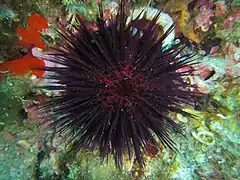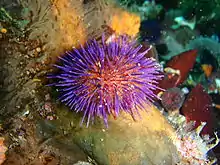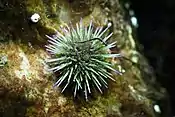| Parechinidae | |
|---|---|
_-_Mar_2010.jpg.webp) | |
| Paracentrotus lividus | |
| Scientific classification | |
| Domain: | Eukaryota |
| Kingdom: | Animalia |
| Phylum: | Echinodermata |
| Class: | Echinoidea |
| Order: | Camarodonta |
| Infraorder: | Echinidea |
| Family: | Parechinidae Mortensen, 1903b [1] |
| Genera | |
|
See text | |
The Parechinidae are a family of sea urchins in the class Echinoidea.
Characteristics
All camarodonts have imperforate tubercles and compound ambulacral plates. In addition, the characteristics of the parechinids include the interambulacral plates being densely covered with tubercles with many subequal tubercles, and the buccal notches being insignificant in size. The globiferous pedicellariae between the spines have widely open blades each with many lateral teeth.[2]
Genera
| Image | Genus | Species |
|---|---|---|
 |
Loxechinus Desor, 1856 | |
 |
Paracentrotus Mortensen, 1903b |
|
 |
Parechinus Mortensen, 1903b | |
 |
Psammechinus L. Agassiz & Desor, 1846 [1] |
|
Fossils
- †Isechinus Lambert, 1903
References
- 1 2 Parechinidae World Register of Marine Species. Retrieved 2011-08-25.
- ↑ The Echinoid Directory The Natural History Museum. Retrieved 2011-08-25.
This article is issued from Wikipedia. The text is licensed under Creative Commons - Attribution - Sharealike. Additional terms may apply for the media files.